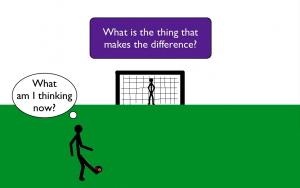One of the key promises of NLP is that it will enable you to develop your own excellence. NLP is the study of excellence in others and of how to replicate that excellence in yourself. The process that NLP uses in order to make that transfer of skills is the process of modelling.
When we think about modelling in NLP, then we are thinking what do we need? What skills would I like to have? Who is excellent at this skill and how are they excellent? Once we have found our model of excellence we concentrate on how to replicate that excellence. In order to do that what do I need to do?
NLP provides many opportunities for the business world to benefit from its modelling techniques. How many senior managers in business are contemplating the following: “How can we get our sales people to sell like them?” “How can we get our marketing department to follow those excellent strategies that they use Apple?”
The whole idea of modelling is not new to us, we have been doing it for years and years as individuals and our children these days are modelling earlier and earlier.
When we think of modelling, a model is just a replica. Did you ever make replica toys or cars or planes or ships when you were a child? You didn’t make the real thing, you made a replica, and that’s modelling.
We tend to think of modelling as being the real NLP, the heart of NLP as that is how NLP was created. NLP co-creators Richard Bandler and John Grinder took what people did well and explored their work and behaviour and made it into a process, they took an abstract concept like rapport and made it into a detailed study of getting into rapport. Now there are at least 20 ways, 20 processes for getting into rapport through NLP. Pre NLP it was just “Ok, now get rapport.”
Modelling then is taking what someone does and making it into steps that someone else can do.
When we consider modelling excellence, there are some things that we may choose to model and some things that we may choose not to model or replicate in any one individual. So, an essential part of modelling is to model what works well and leave out what does not work well.
Modelling is the method that we use to learn most ways of doing things. Like eating. We use a knife and fork by copying or modelling those around us in our childhood. We start with a spoon and then progress to knife and fork. Modelling is something that we naturally do, it is in our learning strategy, but we do it unconsciously.
So what we embark on in our NLP Training is a journey to learn how to model things consciously rather than unconsciously.
You couldn’t drive unless you already knew how to model, so do not worry, this is a skill that we all have already inside us.
Modelling is the process of replication, you can model good processes and you can replicate bad. Modelling in NLP tends to be modelling excellence.
In coaching we coach people to model out of them non-useful behaviours and processes and substitute them for excellence. We model back in a more useful strategy.
We would look to discover what patterns the problem has got. What do they believe about the problem? How do they run the problem? What Strategies do they run about the problem? You model all that out in order to understand how they run the problem.
Modelling is the process of bringing out of someone that which they are doing and then modelling back in again, if it is a problem, a more useful behaviour.
In terms of, let’s say, your workplace. How does that excellent PR person that you know communicate so excellently? What do they believe to be important? How do they do that? What Strategies to they run? What skills do they have? What physiology do they have? What is the first step that drives the whole pattern? How do they refine, on the job, the process of communication?
Take this model and teach it to your supervisors, to your first line managers. Think, how do you get them to communicate better with their people?
How do your best sales people work? What makes them as good as they are? Can you model them? What would it be like if you took those excellent skills and distributed them across your salesforce.
If you think about it then, if someone is doing well in an organisation then you can replicate that and transfer it across to others. Let’s say that you have someone in a small business that does something particularly well. Model it out of them and transfer that skill throughout the team.
What I have found is that in a typical organisation 20% of the people in the company will be performing really well and the other 80% will be coasting along. The 20% will be supporting the other 80%.
This is especially true in salesforces, the top 20% of salespeople will be supporting the bottom 80% in terms of sales and income to the company.
If you can model out the excellence of the 20%, just think about what that could do to your bottom line!
If you are considering NLP training for yourself or in your business then please call us on 0114 2360047 to discuss how Excellence Assured can meet your needs. Alternatively contact us by email: info@excellenceassured.com or complete one of our contact forms on this website.
You can even train and certify in NLP online via our NLP online training centre.


